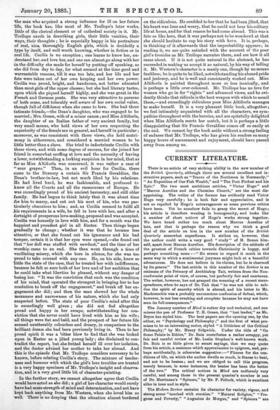CURRENT LITERATURE.
There is no article of very striking ability' in the new number of the British Quarterly, although there are several excellent and in- structive papers, such as " Traces of the Northmen in Normandy," " An Exposition of Our Fish Wealth," and " The Poet Firdasi and his Epic." The two most ambitious articles, "Victor Hugo" and "Marcus Aurelius and the Christian Church," are the most dis- appointing. The writer of the former has evidently read Victor Hugo very carefully ; he is both fair and appreciative, and is not so repelled by Hugo's extravagances as some previous critics have been. Yet he somehow fails to grasp the secret of Hugo ; his article is therefore wanting in homogeneity,• and looks like a number of short notices of Hugo's works strung together. We have heard rather too much about Marcus 'Aurelius of late, and that is perhaps the reason why we think a good deal of the article on him in the new number of the British. Quarterly somewhat superfluous. It strikes ns, however, that the author could write a very good " study" of M. Renan him- self, apart from Marcus Aurelius. His description of the attitude of the greatest of French critics towards Christianity is happy, and perhaps something more :—" He seems to regard it much in the same way in which a sentimental juryman might look at a beautiful adventuress. He does not believe in its claims, but he is charmed by its graces." The last article in this number of the Review is an estimate of the Primacy of Archbishop Taft, written from the Non- conformist point of view, of course, but perfectly fair and courteous. The writer, however, has not grasped the meaning of a recent corre- spondence, when he says of Dr. Tait that " he was not able to sub- due the spirit of anarchy which is abroad, and his letter to Mr. Mackonochie was a probably unconscious confession of defeat, which, however, is not less crushing and complete because he may not have seen its full consequences."


































 Previous page
Previous page